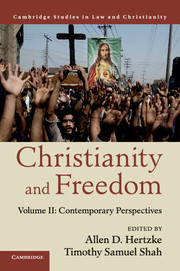Book contents
- Frontmatter
- Colophon
- Contents
- Contributing Authors
- Acknowledgments
- Introduction: Christianity and Freedom in the Contemporary World
- 1 Persecution in the Context of Religious and Christian Demography, 1970–2020
- 2 Patterns and Purposes of Contemporary Anti-Christian Persecution
- 3 Where the Spirit Leads: Global Pentecostalism and Freedom
- 4 Christianity among the Marginalized: Empowering Poor Women in India
- 5 Transnational Christian Networks for Human Dignity
- 6 The Growth and Dynamism of Chinese Christianity
- 7 Christianity and Religious Freedom in Indonesia since 1998
- 8 Christianity and Freedom in India: Colonialism, Communalism, Caste, and Violence
- 9 Vietnam: Christianity's Contributions to Freedoms and Human Flourishing in Adversity
- 10 The Challenge and Leaven of Christianity in Pakistan
- 11 Christianity and the Challenge of Religious Violence in Northern Nigeria
- 12 Copts of Egypt: Defi ance, Compliance, and Continuity
- 13 Between the Hammer and the Anvil: Indigenous Palestinian Christianity in the West Bank
- 14 Christians in the State of Israel: Between Integration and Emigration
- 15 Arab Muslim Attitudes toward Religious Minorities
- 16 They That Remain: Syrian and Iraqi Christian Communities amid the Syria Confl ict and the Rise of the Islamic State
- Index
11 - Christianity and the Challenge of Religious Violence in Northern Nigeria
Published online by Cambridge University Press: 05 February 2016
- Frontmatter
- Colophon
- Contents
- Contributing Authors
- Acknowledgments
- Introduction: Christianity and Freedom in the Contemporary World
- 1 Persecution in the Context of Religious and Christian Demography, 1970–2020
- 2 Patterns and Purposes of Contemporary Anti-Christian Persecution
- 3 Where the Spirit Leads: Global Pentecostalism and Freedom
- 4 Christianity among the Marginalized: Empowering Poor Women in India
- 5 Transnational Christian Networks for Human Dignity
- 6 The Growth and Dynamism of Chinese Christianity
- 7 Christianity and Religious Freedom in Indonesia since 1998
- 8 Christianity and Freedom in India: Colonialism, Communalism, Caste, and Violence
- 9 Vietnam: Christianity's Contributions to Freedoms and Human Flourishing in Adversity
- 10 The Challenge and Leaven of Christianity in Pakistan
- 11 Christianity and the Challenge of Religious Violence in Northern Nigeria
- 12 Copts of Egypt: Defi ance, Compliance, and Continuity
- 13 Between the Hammer and the Anvil: Indigenous Palestinian Christianity in the West Bank
- 14 Christians in the State of Israel: Between Integration and Emigration
- 15 Arab Muslim Attitudes toward Religious Minorities
- 16 They That Remain: Syrian and Iraqi Christian Communities amid the Syria Confl ict and the Rise of the Islamic State
- Index
Summary
INTRODUCTION
It is 7 September 2001, in Jos, Nigeria. A Muslim is appointed to a controversial political position, traditionally held by Christians. Violence erupts in the streets. This is what we saw.
Richard's story: As I was returning to the Theological College of Northern Nigeria, where I lived and worked, it seemed like a normal Friday afternoon in Jos, apart from the traffic on the road, which was much heavier than usual. When I eventually arrived home it was to rumours that fighting had broken out during Muslim salat prayers, precipitating a mass exodus out of the city centre. For the next ten days, until the army intervened, staff and students were confined to the college campus while Muslim and Christian mobs rampaged across the city. As a deterrent to would-be attackers, students armed with machetes took turns to patrol the campus perimeter. Days and nights were disturbed by the sounds of intermittent gunfire, and from the vantage point of a hill overlooking the city we could see smoke rising from multiple locations. A few students ventured out into the neighbouring community, returning with reports of dead bodies on the streets and buildings destroyed.
Danny's story: As I walked through the University of Jos health clinic there were dozens of people sitting and lying around with various kinds of burns and bleeding injuries. Trails of blood crisscrossed each other down the halls and bandage wrappers lay where they had been hastily dropped on the floor. The nurses in their white uniforms looked tired. One doctor was shouting in anger for anyone to hear, “Look at this old woman's arm. What kind of animals will cut an old woman's arm like this? She had nothing to do with this!” The “this” he was referring to was a violent conflict that had started the afternoon before. It was the result of an on-again, off-again appointment of a Muslim man to an office supposedly reserved for the Christian “indigenes” in Nigeria's Plateau State.
We had received word around noon the day before that we should not leave our home on campus because “there is trouble in town.” Fortunately we had had a relatively calm night, so the next day I walked to the university clinic. I had heard that there were many casualties and most of the medical personnel could not get there because of the violence.
- Type
- Chapter
- Information
- Christianity and Freedom , pp. 306 - 337Publisher: Cambridge University PressPrint publication year: 2016



